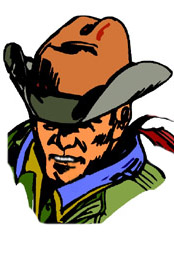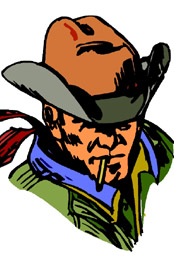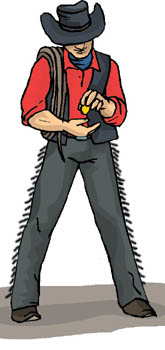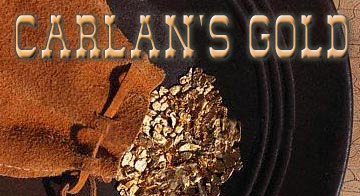
Carlan's
Gold
|
|
Beau's Notes: Carlan's Gold is a fragment of a western story - I'm guessing that this was written in the 1950s (although Carlan is not the typical male hero of that period) and that it was going to be a short story rather than a novel. It is a good example of the way Louis would get a fundamental situation down before going on to work on other things. Here he sets up the captives, the bad guys, the male hero who rides in out of nowhere and alters the power structure in the camp by mentioning the gold. Did he do that to help the woman and her son? Did he do it just because he saw these were bad men and he wanted to stay alive? Obviously, he has some gold but did he really make a strike? Are there really Indians nearby? All this tension creates a good jumping off place if Louis had ever chosen to return to the story. The beginning serves as a set of notes and an active inspiration for further work. |
"He's seen our smoke," Missett squatted on his heels beside the fire, nursing it with small sticks. "But there's small need to worry about a man from those hills."
"I worry about him." Kavanaugh was a lean and savage man who walked like a wolf. "We're not set up for entertaining guests."
Mary Logan was beyond fear. From where she sat she could not see the rider, but there was no hope for her in one rider alone. She had been frightened for three days now and her mind was deadened to it. There was nothing to do but wait, for what she did not know.

"Walsh," Kavanaugh said, "if the girl says one word she shouldn't, kill the boy."
Mary's quieting hand was on her son's knee and she felt it tremble ever so slightly.
The oncoming rider remained in the sun's eye until he rode right up to the camp, a tall man lean in the body and hips riding a line-back dun with a black mane and tail. He looked at the men, the girl and her son.
He had powerful shoulders under a tight-fitting buckskin shirt. He wore a shabby hat and a belt gun, and there was a rifle across his saddle.
"Saw your smoke." His voice was low but had carrying quality. He paused a moment and then added, "There's Indian sign about thirty minutes back along the ridge."
Kavanaugh merely looked at him, trying to make out what manner of man he was. Walsh asked, "Sioux?"
"Blackfeet."
"Ah ..." Walsh bobbed his Adam's apple and thin lines of worry wrote traces in his cheeks.
"It's far south for Blackfeet," Kavanaugh said, "this time of year."
He kept the horse between himself and the men . . .
When the stranger got down from his saddle, Mary Logan was shocked. He wore Indian leggings, fringed and dark with wear, and like many Indians, his buttocks were bare. Hastily she averted her eyes. It was bad enough for an Indian to wear such clothing, for a white man it was indecent.
After the first glance at the boy and herself he had ignored them, but she noticed that when he dismounted from his horse he kept the horse between himself and the men, nor did he turn his back on them at any time. Was it accident? Natural caution? Or did he realize something was wrong here?

"Going far?" Kavanaugh asked the question. He was a big man, tall as the stranger, but heavier. He wore gray striped trousers, boots to his knees, and a buckskin vest. His gun was heavy and worn easy to his hand. Mary Logan was afraid of Kavanaugh.
"Fort Bridger."
He was more than thirty, this stranger was, but there was an agelessness about him that made him seem forever young and forever old. Did he realize these men had killed and were prepared to kill again?
How could he realize? And what could he see? What was there to see but the small fire, the blackened coffee pot, the four men, the girl and the boy? And the six horses.
Her mind reached out to him, trying to grasp his attention without actually looking at him or speaking, trying at once to plead for help and to warn him of his danger.
Six horses ... had he noticed that?
The camp was in a hollow on a hillside, cloaked with aspen. The smoke was dissipated to some extent by the leaves and branches, but this man had seen it. Perhaps when it was first lighted ... there might have been a puff of smoke then.
The stranger's shirt was red, faded by sun and rain, and there was a short jacket of buffalo hide thrown over the blanket roll behind his saddle.
Squatting beside the fire he filled a cup from the blackened pot. He tasted the coffee, and his teeth flashed whitely in a smile, and for just an instant he seemed to be looking at her ... did he smile?
"Coffee tastes good," he commented. He gulped scalding coffee and added, "My name is Carlan." He jerked his head back in the direction from which he had come. "Rough country yonder."
"What's there?" Walsh asked.
"Game ... water if you know where to find it ... and gold."
The word hung in the still air. Mary Logan smelled the wood smoke, smelled the coffee, felt the warm sun ... and felt the impact of the word.
Missett blinked slowly. "Did you say ... gold?" The last word was almost a whisper.
The stranger glanced at his coffee. "Take an outfit to get it out. I mean ... it's there, all right, but it would take a few men. A body can't work a gold claim and watch for Blackfeet at the same time."
Kavanaugh watched Carlan intently, his mind prying at the words as if to find some secret in them, turning each one to see what lay behind it. Walsh and Missett were thieves, murderers, but Kavanaugh was evil, evil beyond the grasp of their simple lack of morals.
"If you found gold," Walsh suggested slyly, "you must have some. Where's yours?"

Carlan chuckled, a small mischievous chuckle. "Now you wouldn't think me fool enough to come away without a sample, would you? Same time, a man would be a fool to bring out enough so a man would want to kill him for it.
"Gold is a mighty obvious thing, heavy to handle, hard to hide, and not easy to get rid of without causing talk."
He tucked a finger in his pocket and drew out a chunk of gold about the size of a thimble. "There might be fifty dollars there ... might be less."
Kavanaugh took, it weighing it in his palm, studying the problem it presented. And as all eyes centered upon it, Carlan glanced at Mary Logan and winked, then gave a brief, appraising glance around the camp.
"There's more of this?" Kavanaugh asked.
"Enough to make a dozen men rich. But, a man would have to know exactly where it was ... it isn't easy to find."
Carlan took the nugget from Kavanaugh's fingers, fingers that yielded it reluctantly.
"How'd you come to find it?"
"Hunting a deer ... when I hit him he slid down the side of the hill and pawed some before he died. He uncovered it, though a sharp eye might have seen it as a likely place."
Mary listened, trying not to look at the man, and trying to be invisible to her captors. She knew they wanted to believe him, but suddenly she was sure he was lying ... but to accomplish what?
"You find much of it there?"
"Filled my hat with nuggets." He took out a short-stemmed pipe and filled it with tobacco. "I hid the rest of it."
"You said it would take several men," Walsh said, "and there's four of us."
He gave it to them then, she did not know who he was or how he knew, but somehow he did.
"You've no outfit," he replied quietly, "you don't have two days grub. You have no pack horses. You don't have ammunition enough."
They had no words with which to argue, for what he said was true and each man of them knew it. To get out any amount of gold would take time, and even if they could get part of their living from the land, there was much they would need, and they had nothing here.
Walsh and Missett were thinking of the gold, Kavanaugh, Mary was sure, was thinking of Carlan, for Kavanaugh did not accept his story as true.
"You have no outfit yourself," Kavanaugh's suspicions clung to his words.
"It's six months since I left the Green," Carlan explained, "and the last two months I've been living with Shoshones. All my grub was gone months ago and my gear worn out. When I saw your smoke I was headed in for supplies and help."
It was their problem too, this lack of supplies. It had held them here, prisoners of their prisoners. To get out any amount of gold would take time, and time meant provisions. Yet they had been unable to go to Ford Bridger because of Mary Logan and her son Jim.
The Logans would be known at Fort Bridger, and none of the group sufficiently trusted the others to leave her alone with those who remained behind.
Kavanaugh turned it over in his mind and Mary Logan sat very still, watching with steady eyes. She was sure she had guessed rightly, and that somehow Carlan understood her predicament and intended to help. At least, he had them thinking of something now, where as when Carlan rode in their one question was when to kill him. Now, suddenly, they were trying to please him, to reach an agreement and to share in his secrets.
"We've got to get grub," Carlan continued, "and we need tools. A man needs a pick and shovel. He could even use some powder. And he needs grub...no way you can figure on wild game ... a man starts hunting and the game is liable to drift clean out of the country."
They knew the truth of what he said. Mary Logan could see that Kavanaugh was chewing it over, but she noticed something else ... Walsh and Taylor were looking to Carlan for the answer, for leadership.
It was fairly up to Kavanaugh now . . .
- End of Fragment -
![]()
BEAU L'AMOUR'S COMMENTS: Unlike a good deal of the material that can be found in Louis L'Amour's Lost Treasures Volumes One and Two, there are no further notes or indications from Louis journal or correspondence about any plans for this story. These Website Exclusives are significantly more incomplete than the the story fragments contained in the books.
![]()
LOUIS
L'AMOUR'S LOST TREASURES
Home | What Is Louis L'Amour's Lost Treasures?
THE NEW BOOKS
Lost Treasures Volume One | No Traveler Returns | Lost Treasures Volume Two
Bonus Materials In Finished Works
WEB SITE EXCLUSIVES
LT + Beyond the Post Scripts in Books | Story Fragments
Pieces of Louis' Mind | Exclusive Photos and Scans
About Lost Treasures | Frequently
Asked Questions | Contact Us
Copyright Notice | Terms
of Use Agreement
The
Official Louis L'Amour Web Site
Home | The
Louis L'Amour Trading Post | About
Louis | Louis
L'Amour Community
The Official
Louis L'Amour Discussion Forum
